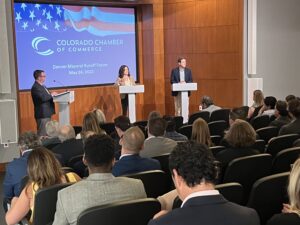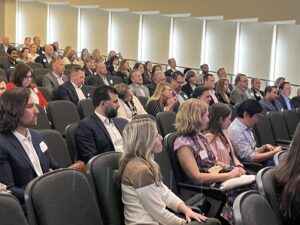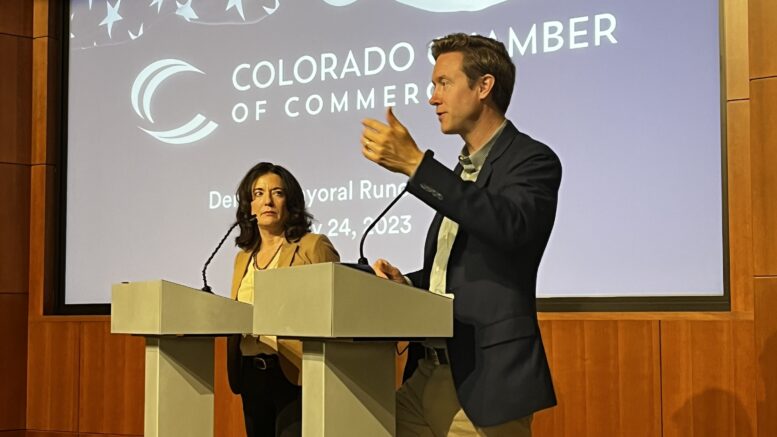Denver mayoral candidates Kelly Brough and Mike Johnston, who have offered nuanced differences on subjects from homelessness to affordable housing, posited similarly subtle but unique positions Wednesday on business issues ranging from economic-development goals to the potential use of a right of first refusal on apartment-complex sales.
Brough and Johnston spoke at a mayoral forum hosted by the Colorado Chamber of Commerce and focused on issues that affect employers in Colorado’s largest city. Denver’s one-time reputation as a national leader among cities has taken a hit due to rising crime and rising costs of living in recent years, and those issues have begun to affect the city’s business atmosphere, leading to potential impacts upon the economic competitiveness of the state as a whole.
Both candidates in the June 6 mayoral runoff said that boosting economic development in Denver is less a matter of increasing tax incentives, particularly when the state offers many, as it is fixing the city’s crime, homelessness and affordability problems. But both said they’d employ incentives currently available, and Brough said that she would like to make further investments in improving Denver International Airport, whose national and international connections serve as an incentive for businesses to locate in such a hub.
Workforce development
Both also said they would focus on attracting a wide range of industries but identified several clusters on which they would concentrate. Brough pointed to biosciences, technology and an outdoor-recreation sector that Denver could appeal to with its environmental efforts, while Johnston fingered cleantech, cybersecurity and a health-care field that can benefit from the ongoing growth of the University of Colorado Anschutz Medical Campus in neighboring Aurora.
Johnston also said Denver can take a more active role in upskilling workers to meet the needs of employers by partnering with industry and nonprofits to launch a workforce-training platform, partially funded by the city, that pays the upfront costs of training. Only when participants land jobs would they — in partnership with their new employer and a philanthropic organization — be required to pay back the costs of training, which would be available to jobseekers at any stage of their career, the former state senator explained.
In the area of workforce development, Brough, the former president and CEO of the Denver Metro Chamber of Commerce, said she would like to partner more with Denver Public Schools and with local businesses to increase paid apprenticeships and internships. She noted, for example, that roughly 10% of city-government jobs currently remain unfilled and that she would look to fill many of those with apprentices and interns.

Former Denver Metro Chamber of Commerce CEO Kelly Brough speaks during the Colorado Chamber of Commerce mayoral forum Wednesday as her opponent, former state Sen. Mike Johnston, listens.
Adding housing
Seeking both to boost the stock of available housing in Denver and to help revitalize a downtown area stung by rising office vacancies and decreasing amounts of workers, both said they would support conversion of some downtown offices to residential buildings.
But Brough put more emphasis on the plan, saying she would offer financial incentives and more flexible permitting to owners of buildings interested in the process. Johnston, meanwhile, insisted such conversions should not be rampant and take away from downtown’s position as a commercial center, though he said he would eliminate concept and site-development plan requirements for owners who want to make the change, in order to ensure that the conversions happen very quickly to meet current needs.
Asked if their administrations would use a right of first refusal to step in and buy apartment complexes that have gone up for sale, Johnston and Brough both said they would, but they showed differences in how much they would like to use the process. Gov. Jared Polis is considering whether to sign a bill that would let local governments take ownership of complexes that are at least 30 years old if cities and counties match a proposed sale price property holders have accepted from buyers, but groups like Denver Metro Chamber of Commerce and the Colorado Association of Home Builders are pushing for a veto of House Bill 1190.
Right of first refusal
Johnston said that he would be “interested in us being able to acquire as many units as we can” at a time when he believes the city needs to add 3,000 new affordable units per year, though he said he would use the tool in ways that would not impact business substantially. Opponents have warned that the proposal, which gives local governments 88 days to consider intervening in such sales, make offers and complete purchases, could chill real-estate investment because it stretches out deals that otherwise may be done in a matter of days.
Brough offered more limited backing for the idea, saying that she would employ the tool only if she could guarantee a much faster timeline than the bill requires. If the city steps in on a pending property sale, it would be only because it knew very quickly that such a move was needed — and could act with equal speed, she said.
In general, the two candidates agreed that they selectively would like to up-zone certain areas to get more multifamily housing constructed rather than push development across the whole of the city, as they feared a proposal killed late in the legislative session would have required. Johnston said the city needs to offer more financial incentives and an expedited regulatory process to boost construction, while Brough said she wants to focus growth near bus routes and existing water infrastructure and believes there are more neighborhoods in which the city can designate accessory dwelling units as a use by right for property owners.
Both said they also want to expand the city’s current push to electrify new commercial buildings to homes as well, though they said they would do so in the near term with incentives rather than with mandates. Both pointed to existing federal mandates that can be garnered to boost energy efficiency, and they agreed any pushes must be sensitive to the cost of electrification.

Attendees at Wednesday’s Colorado Chamber of Commerce mayoral forum listen to candidates Kelly Brough and Mike Johnston discuss business issues.
Denver mayoral candidates weigh in on other legislative proposals
Johnston and Brough also agreed that even if the Legislature were to vote in 2024 to allow local governments to implement rent-control laws — an effort that failed this year — they would not use such tools as mayor. Brough elaborated that such laws in other cities have led to a slowdown in the production of new housing units, which is the opposite result from what Denver needs right now.
Asked about another failed legislative policy that is expected to be reintroduced in 2024, Brough and Johnston also agreed that they would not support any effort to implement a local Fair Workweek policy in Denver. A bill that was killed quickly this session would have required restaurants and retailers to provide workers with schedules at least two weeks in advance and pay them extra if the schedules were to change — a law that cities including New York, Chicago and Seattle have implemented on a local basis.
Finally, while both candidates said they would not take steps to limit individual-vehicle use in Denver, they do plan to beef up transit and multimodal options as ways to lower greenhouse gas emissions. Johnston said he’d like to offer incentives to get more people onto transit and use the increased numbers to boost the safety on buses, and Brough said that she would explore adding circulator buses in neighborhoods that are not near light-rail lines.
